
WANT TO JOIN OUR INCREASED INCOME
REVOLUTION?
Our focus is on helping landlords get the most out of their properties,and increase cashflow by managing their properties on
their behalf as serviced apartments.
Here at Statera, we pride ourselves on being different. Being property investors ourselves, we understand the value of our client's investment in their properties and assets. This is why everything that we do is all about striking a balance - [Statera], creating win-win situations that will allow us to be satisfied with the returns on our service, while at the same time giving our landlords and investors more money
in their pockets than traditional agents can offer. Our landlords enjoy the benefit of having the piece of mind that their investment is being handled with the care and attention that it deserves.
"WE ARE PUTTING THE EARNINGS BACK INTO THE POCKETS OF LANDLORDS AND INVESTORS".
WHY HOMEOWNERS CHOOSE STATERA ESTATES
Statera Estate is a full service agency. This means once you start to work with us, we take over every single part of managing your property as a predictably profitable business, and you can be rest assured that your property is in great condition and maximising on it's potential. Your money will come into your bank account monthly and on time, all without you having to invest any of your precious time
.

EARN AND LEARN
Landlords who work with us,
will not only have thepotential to benefit from an increased cashflow , but theywill also get tolearn the process, andshould they decide they want to do it alone in the future,they will be equipped to do so

TIME FREEDOM
More profits generally means more work, but here's the reality that we're all to familiar with, most Landlords did not get into property to create a second job for themselves. Marketing, managing bookings, handling the cleaners and maintenance team as well as guest communication are some of the things we take away from you, giving you back your time freedom.

OUR EXPERTISE
Not everyone knows how to transform their property into a proper business. You can leverage our expertise in how to understand if there is demand for serviced apartments in your location,how to attract guests on a consistent basis to maximise your income potential, and then finally how to manage the whole process
LEGISLATIVE BENEFITS
EPC 2025
With over 3 million homes falling short of the new epc standard from 2025 (costing them on average £8000), it's no wonder many landlords are now coming to us to help them get around this by using our serviced accommodation model
Section 21
With the rising inflation and the cost of living increase, landlords can not afford for their tenants to miss payments, and to make matters worse, it is taking an average of 12 months to evict tenants at the moment. We can help you avoid this with our serviced accommodation model
Section 24
Want to save on tax? Even if you're not registered as a limited company?Another reason our landlords are overjoyed with us. Get in touch to see how we can do the same for you.
TAX BENEFITS
Capital Gains Tax Reliefs
The good news about having a SA is you can claim a range of tax reliefs that are usually reserved for traders. These include Entrepreneur’s Relief, Hold Over Relief, Relief for Gifts of Business Assets, Relief for Loans to Traders and Roll Over Relief.
Capital Allowances
As the owner of a Serviced apartment, you are allowed to claim Capital Allowance for items such as equipment, household fixtures and furniture. This means that if you decide to go to town with decorating and furnishing your SA, you will be able to deduct these costs from your pre-tax profits.
Pension Contribution
Any profit that you make from your SA is considered as ‘relevant earnings’ which means you can make tax-advantaged pension contributions.
Council Tax or Business Rates
Serviced apartments do not pay council tax. As the owner of a SA you should register for business rates, which will be calculated by your local council. In general, these rates will be lower than council tax.
BTL vs SA
Increased profits
Typically, the same property will generate 2/3x more profit for the landlord or investor, opening many more options for them.
No more nonpaying tenants
With a BTL, you have a contract in place that if the tenant breaks, it takes about 12 months to actually evict them. As a Serviced Accommodation provider, you have no tenants but instead you have guests that pay you even before they arrive.
Property in pristine condition at all times
Due to the nature of the business, Serviced Accommodation properties have to be kept in pristine condition at all times, whilst it's difficult to predict what your property will look like at the end of a tenancy, generally, you will be planning for the worst
More control
Our landlords have full control of their property, many of them for the first time in years. With our services, you decide when it's occupied and when you want to keep it available for yourself, whether that is to host family, guests, it doesn't matter what you need it for, the fact is it is in your complete control with the utmost flexibility to use your asset to it's best advantage.
WHERE DO WE LIST YOUR PROPERTY
OUR PARTNERS:





HOW IT WORKS
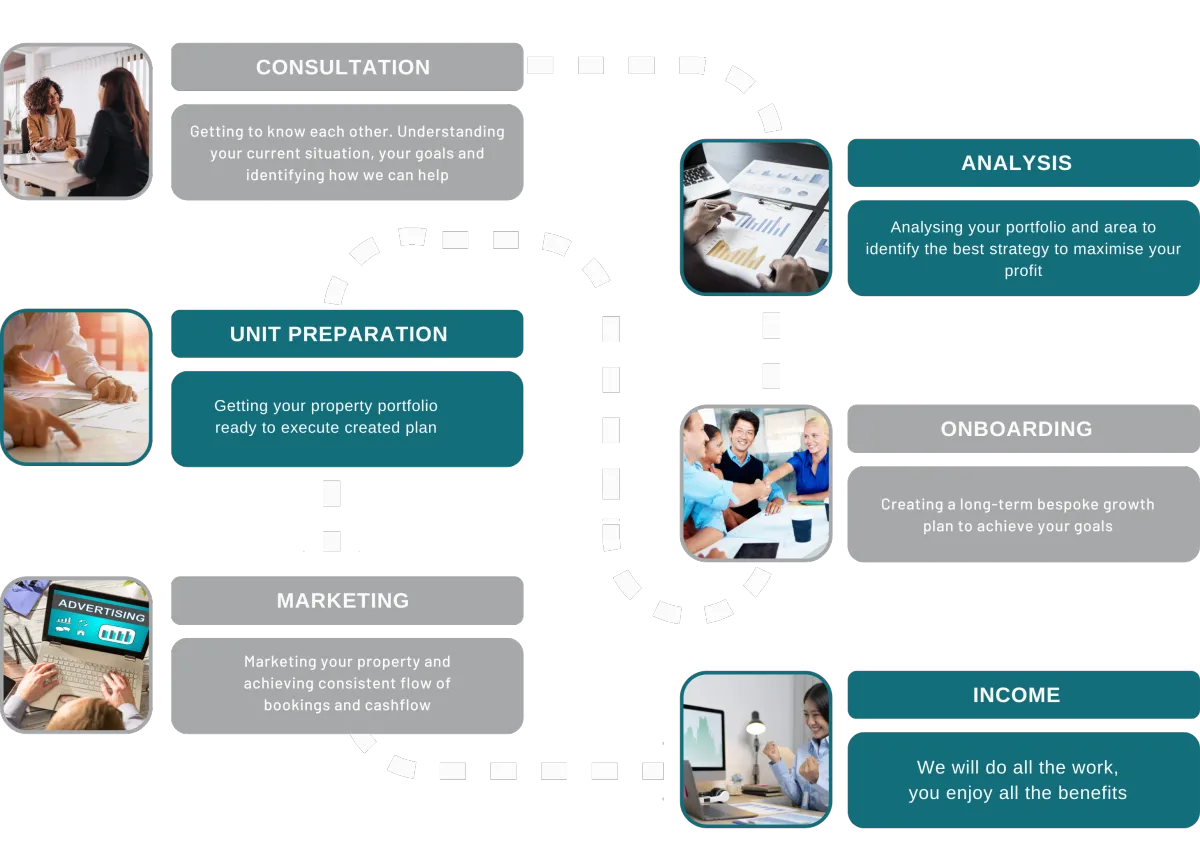
LISTING MANAGEMENT
Optimised for maximum returns.
Maximising occupancy
We'll offer your property on a variety of sites to maximise your booking and revenue potential. Your calendar is synchronised across all of them thanks to our technology, and you get fantastic returns. To assure occupancy all year long, we also concentrate on the corporate market.
Professional photography
With expert photography, we'll raise your occupancy rate and the amount you may charge.
Listing creation and optimisation
We'll set up and create your listings on several platforms in order to improve the amount of reservations and assist attract the correct visitors to your home. Since we have years of experience, we are aware of what is most effective.
Profit growth
We focus on helping you enhance your property's income by effectively pricing it and taking advantage of periods of strong demand. We have both the data and the excellent human ideas that are the foundation of every successful pricing plan.
GUEST MANAGEMENT
Ensuring a 5-star guest stay.
Guest vetting
Your safety and the security of your property are our top priority. We screen all guests.
Check-in and smart-locks
Easy self check-in is a top priority for guests and the Airbnb algorithm loves it too! So we support you through out smart-lock installation process and provide software that will not only to provide guest with easy check in option but also will increase security for your property.
Linen and toiletries
Guests always remember how good the sheets are! We provide hotel quality linen and a high-quality laundry service. Our housekeepers know all the perfect touches for an enjoyable guest stay.
Guest communication
Responding to guests as quickly as possible is the key to getting more bookings and maintaining a good reputation. Our teams respond 24/7/365 and trained to deal with all questions and issues both before and during stays.
PROPERTY MANAGEMENT
Taking care of your property.
Cleaning and housekeeping
5-star Cleans from our Professional Housekeepers. We've work with Airbnb cleaning service providers that are tried and tested with time, to ensure every clean is done thoroughly with guests in mind and are never missed! Cleaners even report back to HQ with photos.
Maintenance
Our housekeeping team take photographs between each guest stay and report on any maintenance items. If it's a small item, we'll fix it quickly. If it's something that needs repairing or replacing, such as washing machine, we can arrange this for you.
Deposits
We take security deposits from all guests for every booking. This protects our downside and keeps the guests accountable.
Reports
Our Dashboard syncs your calendar between multiple booking websites to give you more control and see who is staying. You can also track your performance and income. Clear and transparent.
MAKE YOUR FIRST STEP TO ACHIEVING YOUR FINANCIAL GOALS
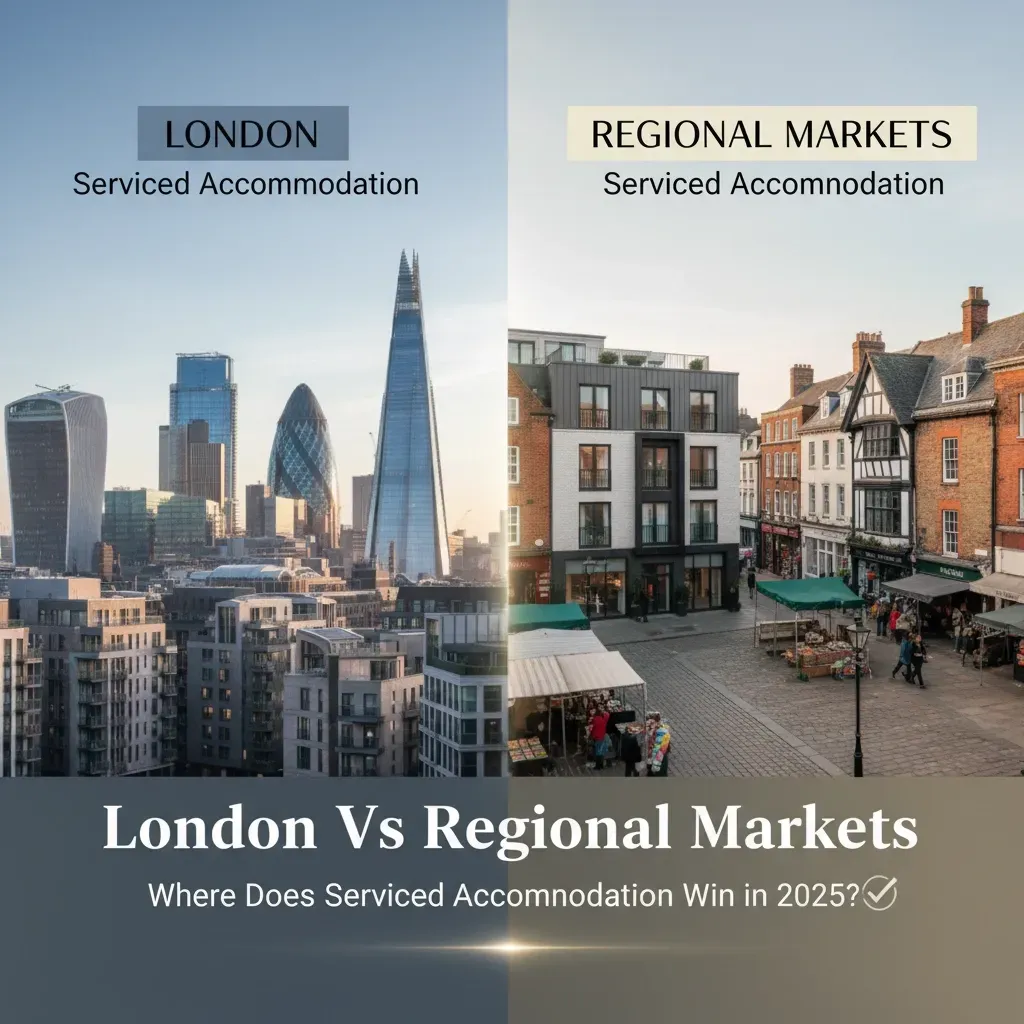
London Vs Regional Markets: Where Does Serviced Accommodation Win in 2025?
The short-term rental game has completely changed in 2025, and if you're still stuck in the traditional rental mindset, you're missing out on serious money. The UK serviced accommodation sector is projected to hit £8.82 billion by 2033, growing at 8.8% annually. But here's the thing: not all locations are created equal when it comes to making the switch from long-term tenants to short-term guests.
At Statera Estates, we help landlords navigate this transition every day, and the question we get asked most? "Should I focus on London or go regional?" The answer isn't as straightforward as you might think. Both markets are absolutely crushing it in 2025, but they're winning for completely different reasons.
Why London Still Rules the Short-Term Rental Game
Let's be honest: London isn't going anywhere. The capital continues to dominate with the highest occupancy rates across major European cities, and there's a reason for that. Corporate travel has bounced back hard, and companies are throwing money at proper accommodation for their staff relocations.
The London Advantage
London's short-term rental market thrives on one thing: premium corporate bookings. We're talking about tech companies, financial services, and consulting firms that need to house employees for weeks or months at a time. These aren't your typical weekend tourists: they're expense account clients who value quality over price.
The numbers don't lie. Direct bookings now account for 48% of revenue in the London market, and that's massive for landlords who've made the switch. When you're dealing with corporate clients through proper short-term rental management, you're looking at consistent bookings, higher nightly rates, and way less hassle than chasing individual tourists.
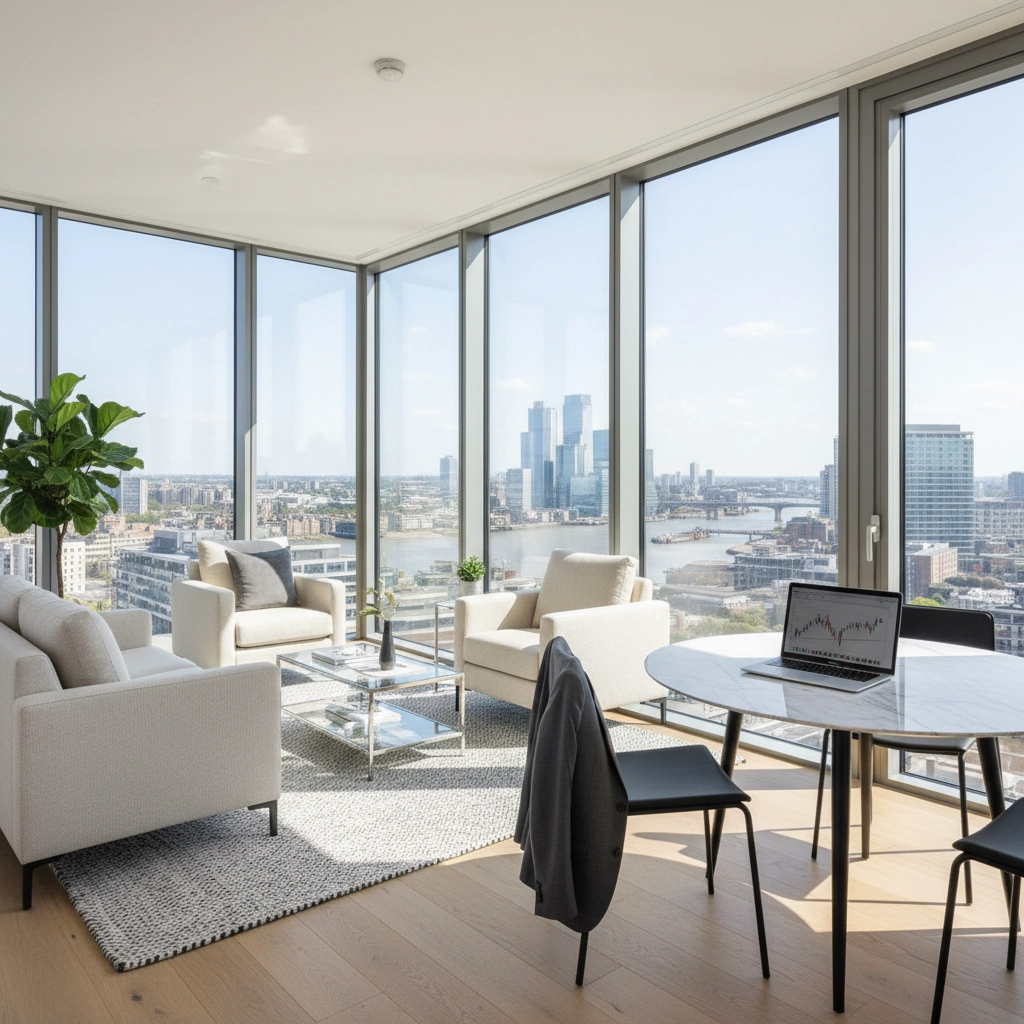
Plus, London's expat and relocation market is exploding: growing at over 10% annually. Post-Brexit corporate relocations mean more structured housing programs, and guess what? Companies prefer serviced apartments over hotels for their staff. It's more cost-effective for them, and more profitable for you.
The Reality Check
But let's not sugarcoat it. London comes with serious challenges. Property acquisition costs are through the roof, competition is fierce, and you're dealing with more regulatory red tape. Your operating costs will be significantly higher than anywhere else in the UK.
That said, if you can handle the initial investment and navigate the competition, London delivers stability. The demand is consistent, the rates are premium, and the market is mature enough that you know what you're getting into.
Regional Markets: The 2025 Success Story Nobody Saw Coming
Here's where things get interesting. While everyone's been obsessing over London, regional markets have quietly become absolute goldmines for smart landlords who've made the transition to short-term rentals.
Places like Morecambe, Preston, Rotherham, and Hull are experiencing serious growth. We're talking about previously overlooked locations that are now generating double-digit returns for landlords who got in early.
Why Regional Markets Are Winning
The secret sauce? Properties optimized for 2-12 week stays are absolutely destroying traditional nightly rentals in many regional towns. Think about it: contractors working on infrastructure projects, NHS staff on assignments, energy sector workers, and the growing army of digital nomads who want to escape London's crazy costs.
These markets work because they solve a real problem. There's a massive lack of quality accommodation in regeneration zones, and short-term rentals fill that gap perfectly. Your guests aren't tourists looking for the cheapest option: they're professionals who need proper accommodation for extended periods and are willing to pay for it.
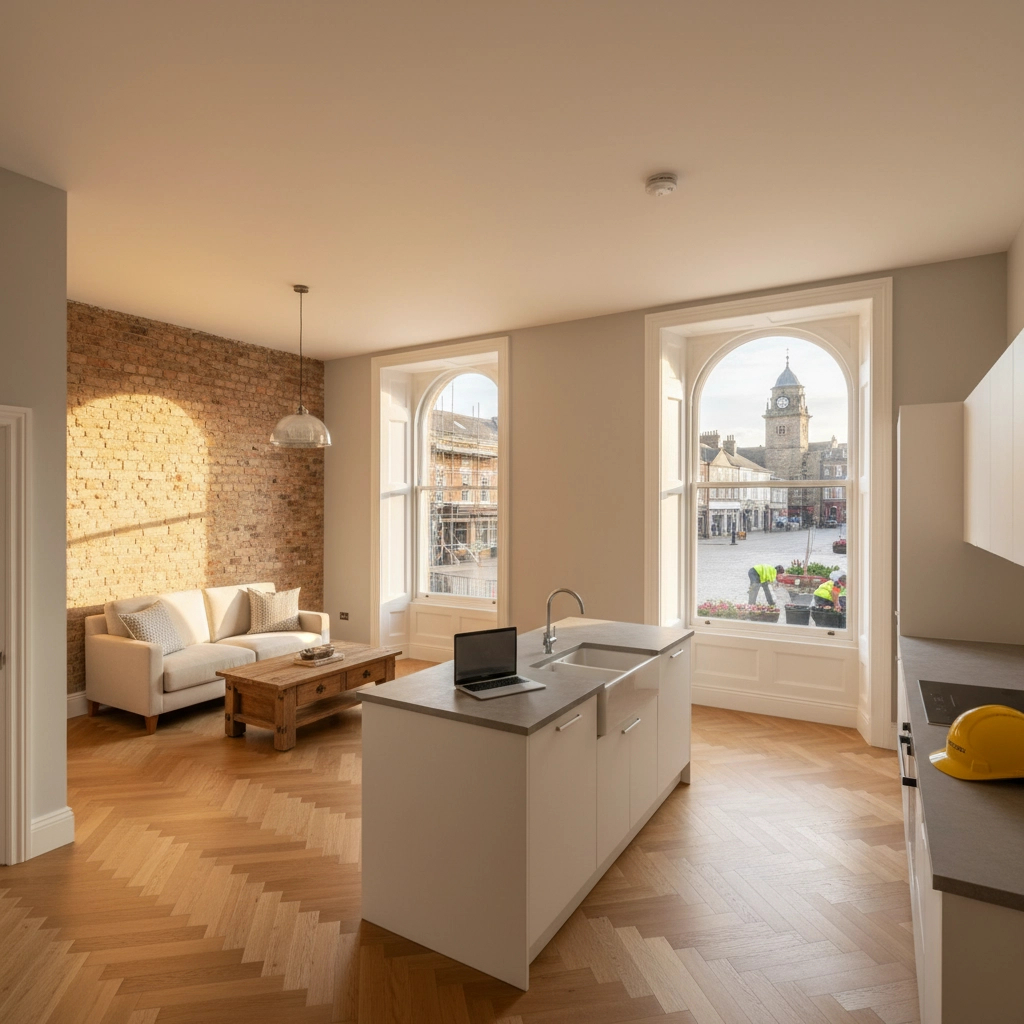
The best part? Operating costs are a fraction of what you'd pay in London. Lower property prices, less competition, and guests who appreciate having a decent place to stay in towns that traditionally offered nothing but budget hotels or overpriced B&Bs.
Breaking Down the Numbers: London vs Regional
Let's get specific about what these markets actually offer landlords making the transition from traditional rentals:
London Performance
Occupancy: Consistently high, especially for corporate-focused properties
Nightly Rates: Premium pricing, particularly in zones 1-3
Operating Costs: High, but supported by strong revenue potential
Competition: Intense, with over 5,200 new rooms entering the market in 2025
Guest Profile: Corporate relocations, international assignees, high-spending business travelers
Regional Performance
Occupancy: Strong and growing, especially for 2-12 week bookings
Nightly Rates: Lower per night, but higher monthly yields due to extended stays
Operating Costs: Significantly lower across the board
Competition: Growing but still manageable in most locations
Guest Profile: Contractors, professionals, digital nomads, long-term work assignments
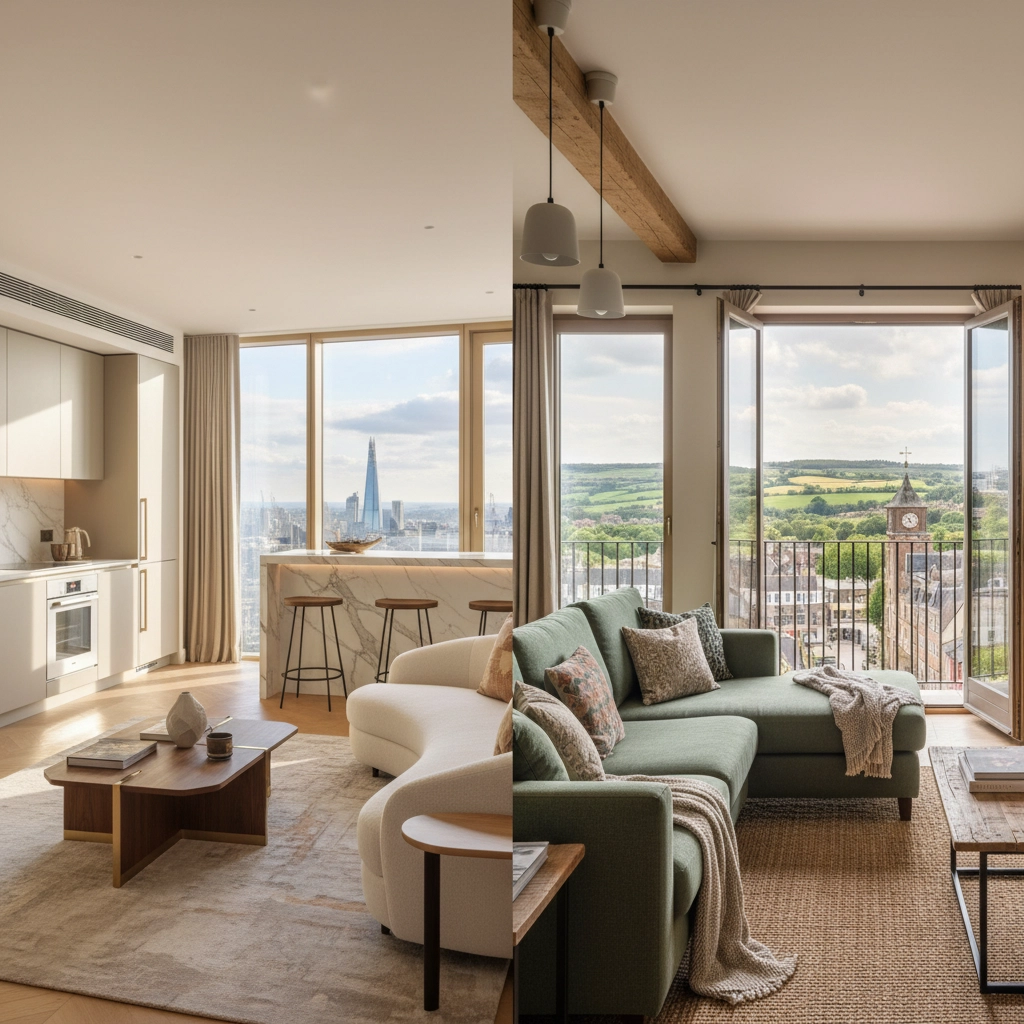
The Infrastructure Revolution Changing Everything
One thing that's completely shifted the game in 2025 is infrastructure investment. Regional areas with major projects: think energy, transport, and regeneration initiatives: are creating consistent, predictable demand for short-term accommodation.
This isn't seasonal tourist demand that fluctuates wildly. We're talking about contractors and professionals who need accommodation for months at a time, week after week. It's the kind of stable, mid-term booking pattern that makes transitioning from traditional rentals a no-brainer.
The technology side is worth mentioning too. AI and automation have made managing short-term rentals so much easier than even two years ago. Remote check-ins, automated guest communications, dynamic pricing: all the stuff that used to require constant hands-on management can now be handled efficiently.
Making the Right Choice for Your Portfolio
So, where should you focus when making the transition from traditional rentals to short-term lets? It depends on what you're trying to achieve and what you can realistically handle.
Go London if:
You've got serious capital to work with
You want to target corporate clients and business travelers
You can handle higher operating costs in exchange for premium rates
You prefer established markets with proven demand
You're comfortable competing in a saturated market
Go Regional if:
You're looking for higher net yields with lower entry costs
You want to get in early on emerging markets
You can identify areas with infrastructure projects or professional demand
You prefer less competition and more opportunity to establish yourself
You're targeting mid-term stays rather than nightly bookings
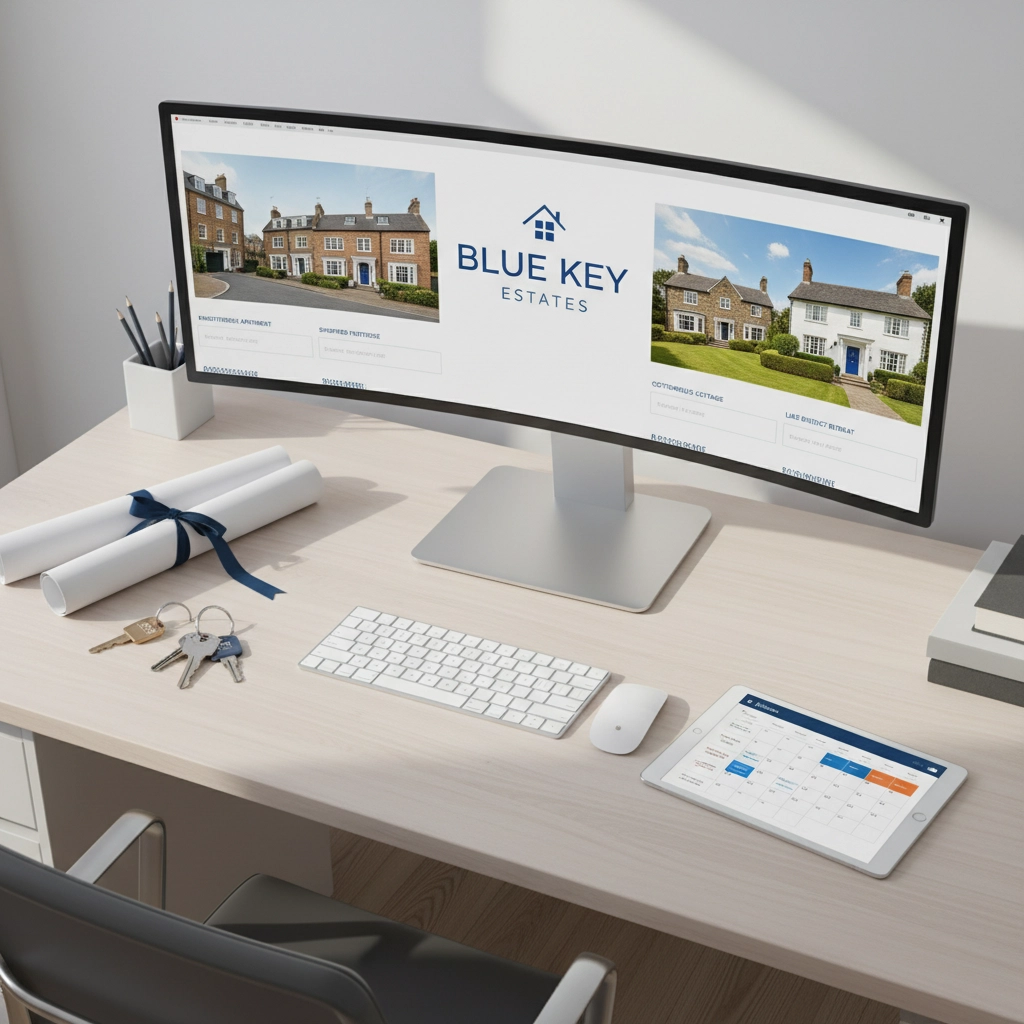
The Smart Money Is Going Hybrid
Here's what we're seeing work best in 2025: landlords who aren't putting all their eggs in one basket. The smartest operators are building portfolios that combine both London and regional properties.
London gives you stability, premium rates, and proven corporate demand. Regional markets give you higher yields, lower costs, and serious growth potential. Together, they create a balanced portfolio that can weather market changes and maximize overall returns.
This hybrid approach also lets you test different strategies. Maybe your London properties focus on corporate clients with direct bookings, while your regional properties target contractors and digital nomads through platforms and local partnerships.
The Bottom Line for 2025
Both London and regional markets are winning in the short-term rental space, but they're playing completely different games. The key is understanding which game matches your goals, resources, and risk tolerance.
What's clear is that landlords who've made the transition from traditional rentals to short-term lets are seeing significantly better returns across both markets. The serviced accommodation sector is expected to grow well beyond its current £1.7 billion valuation, and the opportunities are there for landlords who know how to position themselves properly.
The question isn't really whether London or regional markets are better: it's whether you're ready to make the transition from traditional rental income to the kind of returns that short-term accommodation can deliver in 2025.
If you're thinking about making the switch, now's the time. The market is mature enough to be stable but still growing fast enough to reward early movers. Whether you go London, regional, or hybrid, the opportunity is there for landlords who are ready to evolve with the market.
HERE
HIM DECIDING TO GO FOR A
TRADITIONAL RENTAL VS USING OUR SERVICES

90%
Occupancy rate
2X
Profit comparing to BTL
9.5
Excellent on Booking.com

Godwin
"Before I came across Statera Estates I had this property vacant for 2 years. I was starting to get frustrated and was thinking about selling because I did not want to go back to dealing with regular tenants. If someone had told me 2 years ago that I could make more than double the profits on this property and not having to deal with tenants, I would have never believed them, but that is exactly what has happened. My property is looking the best it ever has, always book booked out and I never have to ask any questions because I have my own portal which allows me to see exactly what is happening at any given point. I could not recommend this company highly enough!"
USEFUL TO KNOW

Lots of landlords are unaware of the potential to increase the income they generate from their properties. So much so that a whole new income strategy has come out of this lack of knowledge, called rent-to-rent.
This is where landlords are offered guaranteed rent for a fixed term, this could be anywhere from 12 - 60 months, the landlord then allows the service provider to sublet the property, which they then turn into serviced apartments. In theory, there are benefits to the landlord, as they no longer have to worry about void periods, management, evictions etc. The difference between what the service provider
rents the property from the landlord for, and what they are able to get on the open market, is theirs to keep as profit
.
AT STATERA ESTATES, WE BELIEVE THERE IS A BETTER WAY!
Having worked with many investors, we understand the landlords journey, the sacrifices they have made to put themselves on the ladder, and as such we believe it is unfair that so many property investors and landlords are missing out on the opportunity to maximise on the investment that they’ve worked very hard to attain, while others are often times making more money from their properties than they are as landlords and investors.
GET THE MOST OUT OF YOUR PROPERTY
INCREASE YOUR CASHFLOW
MORE TIME, WE MANAGE IT FOR YOU
CUTTING OUT THE MIDDLEMAN
LEGISLATION AND TAX BENEFITS
We decided that we will focus on helping landlords get the most out of their properties and increase cash flow by managing their properties on their behalf as serviced apartments, and in the process, cutting out the middleman. This puts the control back into their hands as they are now able to benefit from all the legislation that doesn't apply to using your property as a serviced apartment.
WANT TO JOIN OUR INCREASED INCOME REVOLUTION?
TERMS &
CONDITIONS
PRIVACY POLICY




Statera Estates Management LTD is a company incorporated in England and Wales with registered number 16829215 and registered offices at 321-323 High Road, Chadwell Heath, Romford, Essex, RM6 6AX, United Kingdom.
Statera Estates LTD is registered with the Information Commissioner’s Office, with registration number ZB361736
Statera Estates LTD is a member of The Property Ombudsman Scheme, with membership No. T08031.




